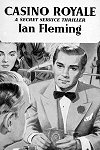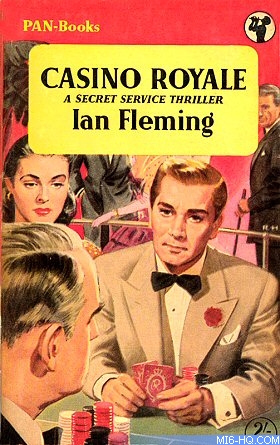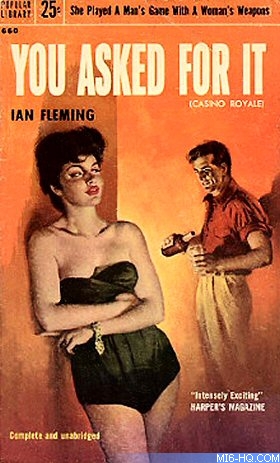 |
| |
David Mazzotta reviews Ian Fleming's debut novel
- Casino Royale - and asks, what was it like in the
beginning?
|
|
Casino Royale - Review
7th February 2005
Fifty years ago, Ian Fleming
produced an unassuming espionage thriller without the slightest
notion that he was spawning an unparalleled entertainment franchise
and a mythology that continues to pervade popular culture half
a century later. What was it like in the beginning?
The plot of Casino Royale
is straightforward Cold War cloak and dagger. A despicable villain
known as LeChiffre is in trouble. He has used good deal of Soviet/Commie-backed
Union money to satisfy his own grotesque personal needs and, because
his brothel business has been legislated away, he turns to gambling
to get the money required to make his re-payment. LeChiffre is
desperate, knowing full well that should he fail to come up with
the required cash, he will be dealt with by SMERSH, a Soviet Agency
Far More Secret And Dangerous Than The KGB. The Good Guys - meaning
British Intelligence with help from French and American allies
- aim to destroy LeChiffre and scandalize the Soviet/Commie-backed
Union by sending their best gambler, James Bond, to bankrupt him
at the game of baccarat.
|
As the birthplace of Bond, Casino Royale can provide us
with the definitive answers to some burning questions that
have trouble mankind for many years. Specifically: he does
introduce himself as "Bond - James, Bond"; the car is not
an Aston Martin or a BMW - it's a Bentley; and the drink
is not a vodka martini (shaken, not stirred) - it is: three
measures of Gordon's Gin, one of vodka, and half a measure
of Kina Lillet. Shake very well until it's ice-cold, serve
in a deep champagne goblet, and garnish with a large thin
slice of lemon-peel.
But what can we say of the novel Casino Royale once we
divorce it of fifty years of cultural baggage?
The first thing that strikes you is the vast difference
in the mores and manners expressed in the book compared
to contemporary society. That is not to suggest that Casino
Royale is intended to be a realistic portrayal of the times,
but the idealized milieu of the 1950s is quite different
from what its contemporary counterpart would be. Dress is
overly formal. Everyone smokes - all the time, everywhere.
They drink pretty much constantly, too; a behavior now generally
confined to college campuses.
|
|

Above: British Pan paperback edition. |
It will surprise no one that Bond is an unrepentant misogynist.
When finding himself paired with a female agent - the lust-inducing
Vesper Lynd - he is disgusted in spite of his sexual attraction
to her. Bond firmly maintains that women are only "for recreation",
and declares her to be a "stupid bitch" - although not to her
face, gangsta rap having yet to make that fashionable. Yet, as
a chivalrous woman-hater, he is compelled to go on a dangerous
pursuit when she is kidnapped by the Evil Villain. This act of
overt male heroism ends with Bond getting tortured by having his
genitals beaten so badly that it takes him weeks in a hospital
to recover. Upon recovery, he is consumed with a desire to bed
Vesper Lynd in an effort to prove he can still, ahem, perform
as man.
Otherwise, Bond comes off as a comparatively genuine and human.
For example, unlike in the movies, his peccadilloes are not the
result of supercilious snobbery. He is condescending as he gives
detailed instructions to a waiter for the preparation of a meal,
but subsequently explains to his dinner companion that he does
that because he usually eats alone when he is working and it makes
the meal more interesting. Bond is cold and carries many distasteful
personality traits, but he is not unsympathetic.

Above: American Popular Library paperback
edition - the publishers renamed the novel to "You Asked
For It" in an attempt to boost flagging sales. |
|
The supporting cast doesn't fare so well. CIA agent Felix
Leiter, perhaps reflecting British sentiment towards Americans,
comes across as relatively useless but a good man to know
if you ever need money. Vesper Lynd is said to be capable,
but shows little skill beyond being attractive. The villain
LeChiffre is a cookie cutter creation.
Although Fleming occasionally spends a bit too much time
dwelling on the minutiae of dress and d�cor, for the most
part the novel is well-paced and tautly written, in contrast
to your average Tom Clancy boat anchor.
The story can be cleanly divided into two parts. The first
section is the standard espionage fodder of bugged hotel
rooms and assassination attempts, with the exception of
an extended sequence on the fateful game of baccarat, both
an overview of how the game is played and the description
of the Bond/LeChiffre showdown. This is a wonderfully written
section - the card game is more exciting than the bombs
and car chases. It will make you want to play baccarat next
time you're in Vegas.
|
The second part of the story follows Bond's recovery from the
above mentioned torture and is oddly melodramatic and romantic;
certainly not the sort of thing one expects from an action oriented
genre. It is a difficult task for a novelist, to maintain reader
interest through character development after spending the first
half of the book portraying bombastic daring-do. Fleming makes
a solid attempt, but the senses are already overwhelmed and any
delicacy and subtlety seem anti-climatic. Eating steamed broccoli
may be healthy, but it still tastes bad after a chocolate sundae.
Another shortcoming is the lack of humor or irony - there are
no clever gadgets, and no witty repartee. In fact, the only humor
is unintentional. When speculating what motivates a LeChiffre
henchman to be a cold ruthless killer, Bond decides the answer
is drugs - probably "Marihuana" (the 'h' is not a typo). One wonders
what prompted Fleming to eventually settle in Jamaica.
Fifty years on, Casino Royale is a passable espionage thriller.
A fair companion for a cross-country flight or for reading a chapter
or two before you go to sleep. Darker and more serious than pop-Bond,
but not more entertaining.
Prepare Yourself For Casino Royale In 2006!
Related Articles
 Casino Royale - Literary
Coverage
Casino Royale - Literary
Coverage
 Casino
Royale - Literary Primer
Casino
Royale - Literary Primer
 Casino
Royale (2006) - Movie Coverage
Casino
Royale (2006) - Movie Coverage
 Casino
Royale - Titan Books Coverage
Casino
Royale - Titan Books Coverage
Review first published by kuro5hin.
Republished with kind permission of David Mazzotta. Click
here to visit his blog.